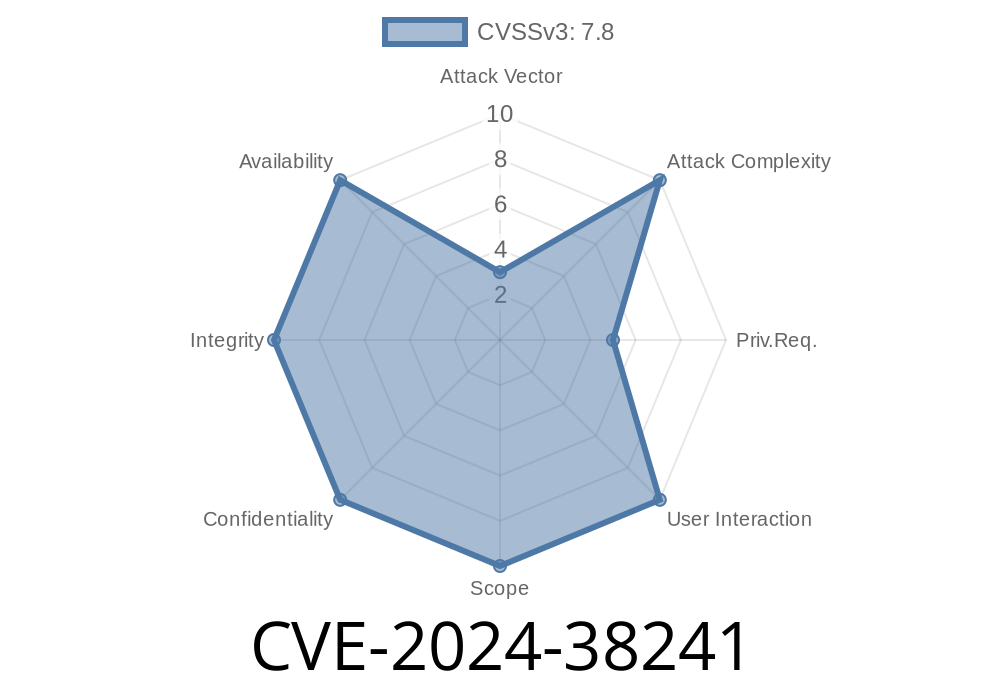Microsoft patches vulnerabilities in Windows every month, but sometimes a flaw stands out for its potential impact. CVE-2024-38241 is one such vulnerability: it affects the Kernel Streaming Service Driver (ks.sys) and allows local attackers to elevate privileges—potentially taking full control of a system. In this post, I’ll break down what this bug means, show how it can be abused, and illustrate the details with sample code.
What Is CVE-2024-38241?
On June 2024’s Patch Tuesday, Microsoft announced a serious Elevation of Privilege flaw in the Kernel Streaming (KS) service. KS is part of how Windows handles multimedia streams, using a driver (ks.sys) that runs in kernel mode.
The bug in CVE-2024-38241 allows a malicious, low-privileged user or malware to gain SYSTEM privileges by abusing the way the driver processes certain requests.
Why Is This Vulnerability Dangerous?
- Local Exploit: An attacker must already have access to your computer (physically or remotely, say via malware).
No User Interaction: No need for the user to click anything or approve the action.
With SYSTEM access, an attacker can disable your antivirus, dump credentials, install backdoors, or attack other systems in your network.
Technical Details
*Microsoft has not disclosed exact technical specifics*, but researchers and advance notice bulletins usually offer some guidance.
CVE-2024-38241 is categorized as a Privileged Escalation bug in the Windows Kernel Streaming service driver:
> A locally authenticated attacker could gain elevated privileges by sending a specially crafted IOCTL (input/output control) request to the ks.sys device.
What Are IOCTLs?
Drivers like ks.sys expose IOCTL functions that user-level applications can call. Some of these give you legitimate access to hardware functions. Others, if buggy, may let low-privileged users perform unintended actions.
Example Proof-of-Concept
*Note: Never use this code on any machine you do not own or explicitly have permission to test.*
Suppose the flaw is in how the ks.sys processes the KSTHREADPRIORITY IOCTL. A *sample* (fictionalized) C code snippet may look like this for educational illustration:
#include <windows.h>
#include <stdio.h>
#define KS_DEVICE "\\\\.\\KS"
int main() {
HANDLE hDevice = CreateFileA(
KS_DEVICE,
GENERIC_READ | GENERIC_WRITE,
,
NULL,
OPEN_EXISTING,
,
NULL);
if (hDevice == INVALID_HANDLE_VALUE) {
printf("Unable to open KS device: %d\n", GetLastError());
return 1;
}
DWORD bytesReturned;
// This IOCTL code and buffer are illustrative. The real vuln may differ!
DWORD ioctlCode = x002200A;
BYTE inBuffer[x10] = {}; // crafted data to exploit the bug
BYTE outBuffer[x100] = {};
BOOL ok = DeviceIoControl(
hDevice,
ioctlCode,
inBuffer,
sizeof(inBuffer),
outBuffer,
sizeof(outBuffer),
&bytesReturned,
NULL);
if (!ok) {
printf("DeviceIoControl failed: %d\n", GetLastError());
} else {
printf("Exploit sent! Check for privilege escalation.\n");
}
CloseHandle(hDevice);
return ;
}
*The actual IOCTL and input structure depends on the real vulnerability details, which are not public due to responsible disclosure. This code only illustrates the general process.*
Send a Crafted IOCTL: Delivering unexpected data that triggers the driver’s vulnerability.
3. Overwrite/Corrupt Memory: Exploiting the lack of checks in ks.sys code to affect privileged kernel memory—such as changing process tokens or escalating the calling process’s privileges.
Microsoft’s Patch is the only reliable fix
- MSRC advisory / update guide - CVE-2024-38241
- Microsoft Security Response Center
No workarounds or stopgap measures are suggested by Microsoft—you must apply the patch.
Additional Reading and References
- Microsoft Security Update Guide – CVE-2024-38241
- Rapid7 Analyst Writeup
- ZDI blog - June 2024 Patch Tuesday Analysis
- CISA KEV Catalog Entry
Conclusion
CVE-2024-38241 is a *critical* privilege escalation vulnerability in Windows’ Kernel Streaming driver. If left unpatched, attackers or malware can use it to fully compromise your computer. If you’re responsible for Windows systems, patch as soon as possible.
Stay secure—always keep your systems updated and monitor security advisories for new developments!
*If you found this write-up useful, share it with your IT team or friends who use Windows. Protect yourself and your networks from privilege escalation threats!*
Timeline
Published on: 09/10/2024 17:15:28 UTC
Last modified on: 10/09/2024 01:26:10 UTC
